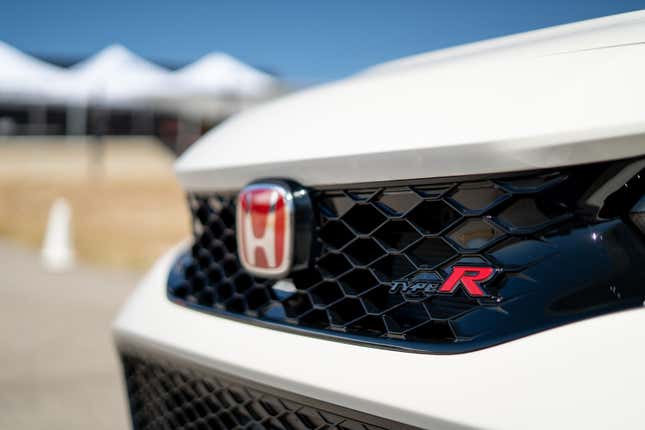They say to never meet your heroes. Put someone on a pedestal and they’ll only disappoint you, so by keeping your distance you can live in your brightest fantasies rather than heartbreaking reality. Of course, this isn’t always true – I’ve met the previous-generation FK8 Civic Type R, built from 2017 to 2021, and the reality of that car more than matches the dream.
What’s more concerning is watching your heroes age. After all, what’s more terrifying than the unknowable future? As the years and generations go by, will your dream car barrel forward unimpeded? Or will it step back, fade from public life, and let the good times dance across its mind? With a Civic Type R key in my hand, and six laps of Harris Hill Raceway ahead of me, I sought to find out.
Full disclosure: Honda shipped me out to Austin, Texas for the Formula 1 US Grand Prix. The company paid for my airfare, lodging, transportation and food, and arranged for the attending journalists to meet multiple F1 drivers. Also, Pierre Gasly kicked my entire ass at ping pong. Oh, and Honda let me take six laps around Harris Hill in the new Civic Type R.
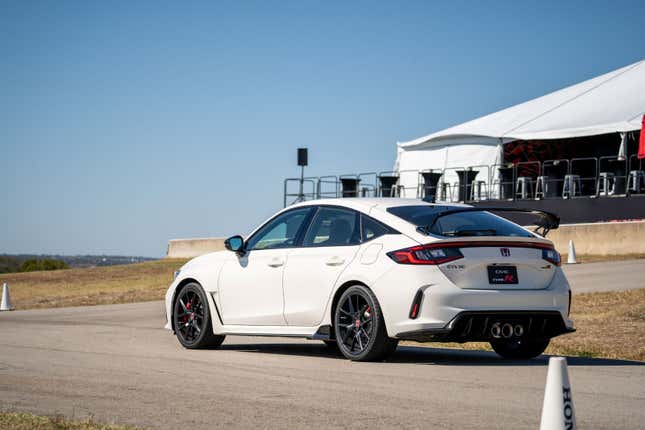
What’s New About the 2023 Honda Civic Type R?
Most notably, the chassis. The new FL5 Type R rides on the11th-generation Civic platform, making it longer, wider, and stiffer than the old FK8. After driving this chassis in the new Civic Si and Acura Integra, I have enough seat time to make a final judgment: it’s unequivocally good.
Of course, there’s more than just the chassis distinguishing the FL5 Type R from the FK8. The new Type R uses the same 2.0-liter engine, but it’s been upgraded with a new turbo, giving it nine more horses and 15 more lb-ft of torque. That means 315 horsepower, peaking at 6,500 RPM, and 310 lb-ft holding flat from 2,500 all the way up to 4,000 RPM.
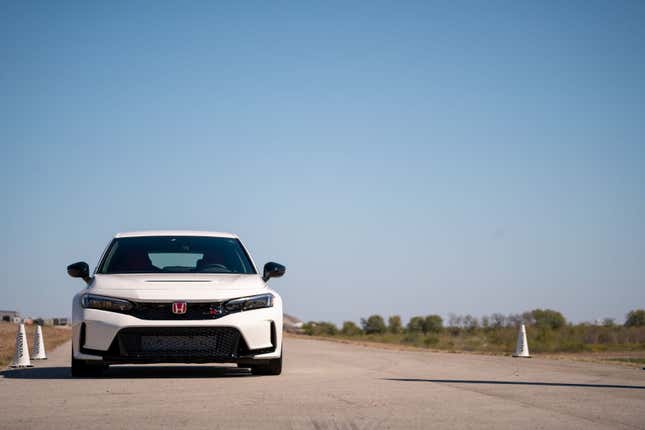
That engine’s sound reaches the outside world through a revised exhaust, now featuring an electronically-actuated valve controlling the flow through the center of its three tips. Honda claims the new Type R is quieter than the old one with that valve closed, but louder than before with it open – a welcome change from the old car’s single understated tone. Inside, Honda claims more engine sound regardless of drive mode.
The FL5 Type R has a larger grille and hood vent, to combat the previous car’s on-track cooling issues. The steering system was re-engineered with plenty of new parts, which Honda says should bring more front-end feel to the driver’s hands.
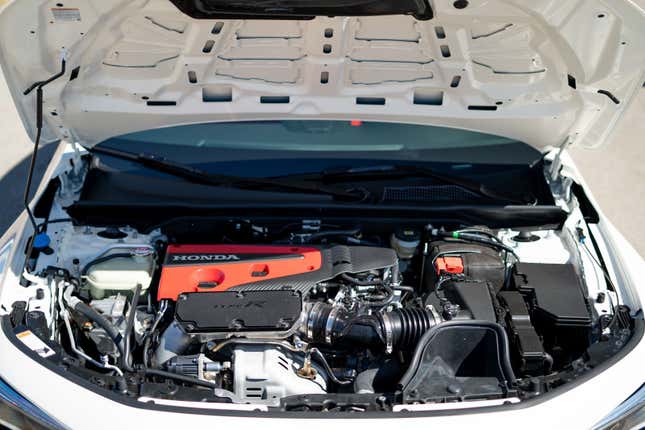
What Are the Specs?
In standard trim, the FL5 Type R comes with 265/30-19 Michelin Pilot Sport 4S tires, though my test car had the dealer-upgrade Pilot Sport Cup 2s in the same size instead. The Type R is, as always, available only with a six-speed manual transmission – the same gearbox as the FK8, upgraded with a lighter flywheel and quicker electronic rev-matching. The old car’s helical limited-slip differential is back, as are the four-piston front Brembos – which, somehow, feel even more confidence-inspiring in the new chassis.
The last number worth mentioning is the price: $42,895, plus $1,095 in destination fees. If you’re looking to shell out that sum, you can do so tomorrow – the Type R officially goes on sale on October 28.

How Does It Look?
The previous Type R was, in a word, divisive. Some people thought it looked over-styled and dumb, like a Gundam, while others thought it looked interesting and mean, like a Gundam. For my part, I disliked the FK8 on launch but grew to adore it after seeing the car in person. The new Type R is subtler, less out-there, but no less aggressive than the old one.
Most of the body panels on the Type R are unique, from the wide front fenders and vented hood to the diffuser out back. Only the lights, front doors, roof, rear hatch, and glass are shared with the base Civic – even the rear doors had to be widened to flow into those flared rear fenders. There’s no mistaking this Type R for a standard Civic.

How Does It Drive?
This is, of course, the big question. The last Type R offered an incredible driving experience, and the current-generation Civic Si is a massive improvement over its predecessor. Does the new Type R follow the same trend, outdoing its past self?
Kind of.
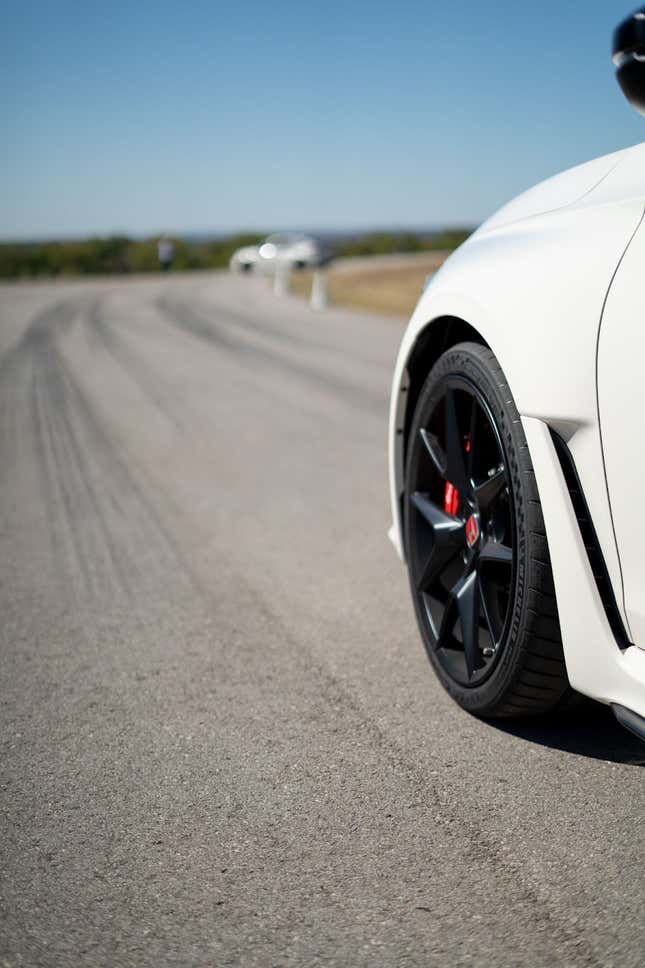
The last Type R was incredible in just how manic it was. It constantly pushed you to go faster, turn harder, brake later. It was a bad influence, in the best way, always goading you on.
The new one, by contrast, is more composed – it’s grown up, beginning to take itself a bit more seriously. This makes for a driving experience that’s less raucous, more focused. The new car is faster around a track (at least, around Suzuka), and more stable and composed despite my less-than-stellar inputs.
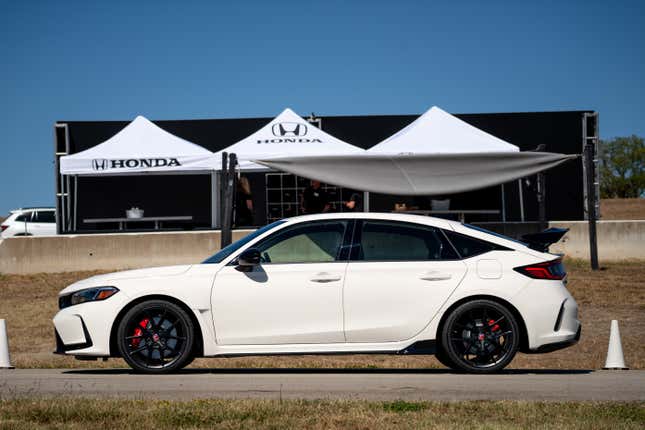
But this focus comes at a cost: the new Type R lacks some of the excitement of the old car. The steering is more numb than the prior generation at commuting speeds, only waking up once you move from Exceeding the Posted Limit to Reckless Endangerment. The car is most at home on track.
The FL5’s wheelbase is nearly an inch and a half longer than the FK8’s, which makes for both benefits and detriments. On the straights, it’s planted and composed, but like its little brother it can’t hide the extra size when taking a tight corner.
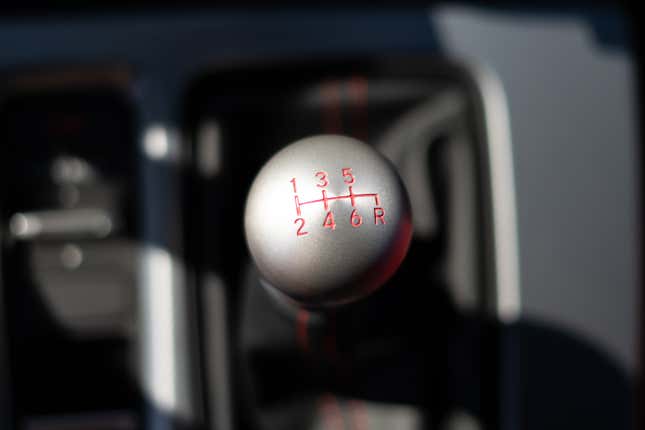
That’s not to say the new Type R isn’t entertaining. While the front end may have lost some emotion, the rear has gained it in spades. This car wants nothing more than to rotate, diving into apexes under braking with conviction that some rear-wheel-drive sports cars can only dream of. Bring your BRZ, your Miata, or your Focus RS, and let the Civic Type R show them all what it means to turn in.
The power is solid; it doesn’t feel particularly stronger than the old car, and the numbers reflect their similarities. Like to the last generation, you’re treated to a massive swell of low-end torque that carries through into the perfect amount of top-end power. The new car does seem to run out of steam before redline, and a look at Honda’s dyno chart shows that peak power confirms it – peak power comes at 6,500 RPM, then drops off as the needle approaches redline.
In all, the new Civic Type R is still a joy to drive. It may tone down the frenetic front end I loved so much in the last car, but balances that out with a wildly entertaining rear axle. Of course, the Michelin Cup 2 tires play into the new character, but the 2023 car still feels meaningfully different from the prior one.
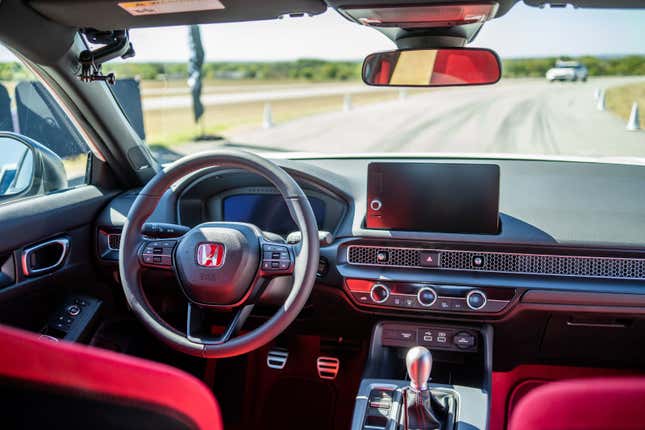
How’s The Interior?
The Type R’s interior is a great place to spend your time, with all the right touch points in all the right places – made from all the right materials. The seats, already a benchmark in the FK8, have been improved with better lumbar support and a slightly revised shape. They also feature the Type R logo embossed in the headrest, a wonderfully dorky detail that I now want in every car.
The shift lights on the dash, conspicuously absent from the U.S.-spec Civic Si, make a triumphant return here. They’re accompanied by an audio shift notification, which is helpful when you’re looking at your apex cones rather than the instrument cluster ahead of you. The steering wheel, bare metal Type R shift knob, and pedals all just feel good to use – nothing’s rubbery or cheap.
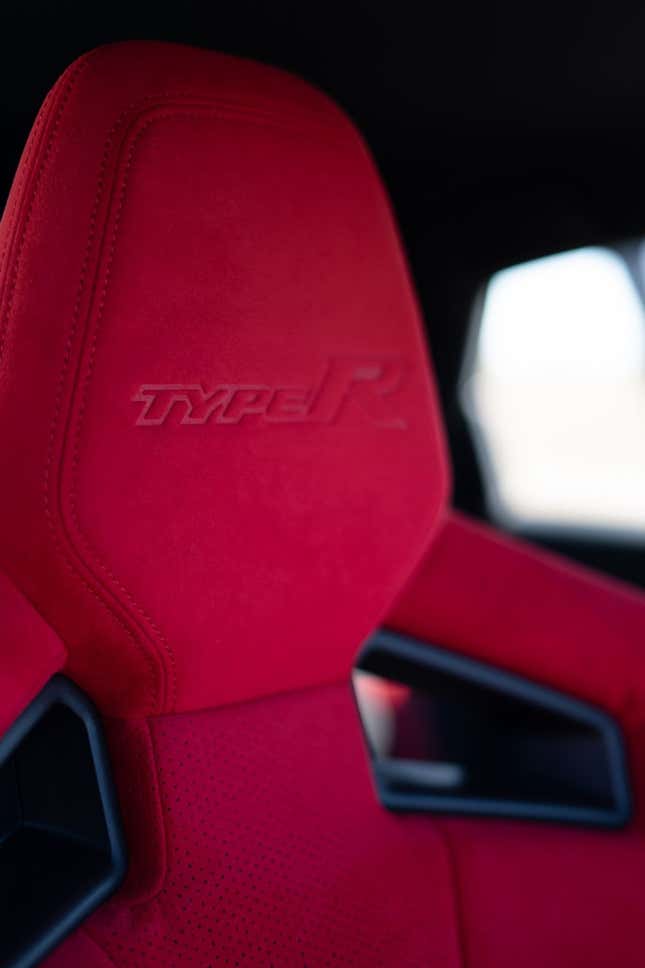
How Does It Compare to the Competition?
With only six laps in the car, I’m hesitant to make any sweeping conclusions. We’ll have more time in the car soon, including time spent on normal roads, which will make for a more well-rounded experience to compare against. But with all those qualifications aside, how does it stack up?
The big competitor is the Volkswagen Golf R. It’s a natural comparison – they have identical horsepower, near-identical prices, and similarly practical body styles. The Civic is the racier of the two, with its high bolsters and bright-red interior, while the Golf claims to be more civilized. But the new Type R makes strides towards civility, with its toned-down steering and longer wheelbase, meaning it could be the best of both worlds.

There’s also the GR Corolla to consider, with its $35,900 starting price making it considerably cheaper than the Civic Type R. That money even gets you all-wheel drive, though the Toyota has 10 fewer horsepower than the Honda. If you want the Corolla with limited-slip differentials — and, for track use, you do — that brings the Toyota’s sticker up to $37,080. Still a hefty savings, but the Civic’s interior is a nicer place to spend your time.
There’s also the oddball competitor, the Elantra N, which sits in a weird place in the market — more powerful than the Civic Si, but out of its league against the Type R. Personally, I’d take either Civic over the Hyundai on looks alone, but maybe the Elantra’s wide-mouthed grille grows on you once you live with it.
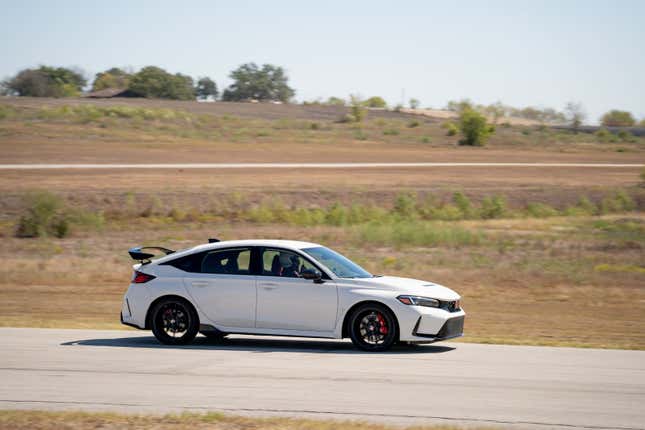
Final Thoughts
So we return to our original question. As your heroes age, what becomes of them? Is the FL5 Type R a new peak for the model, or is it too staid and mature to wear the red R badge? The answer is complicated.
Had Honda combined the front-end freneticism of the previous Type R with the newer model’s lively rear end, the result would have been the perfect car. Shut down every other production line, convert them all to build that perfect imaginary Type R. But Honda didn’t do that, which makes our questions harder to answer.
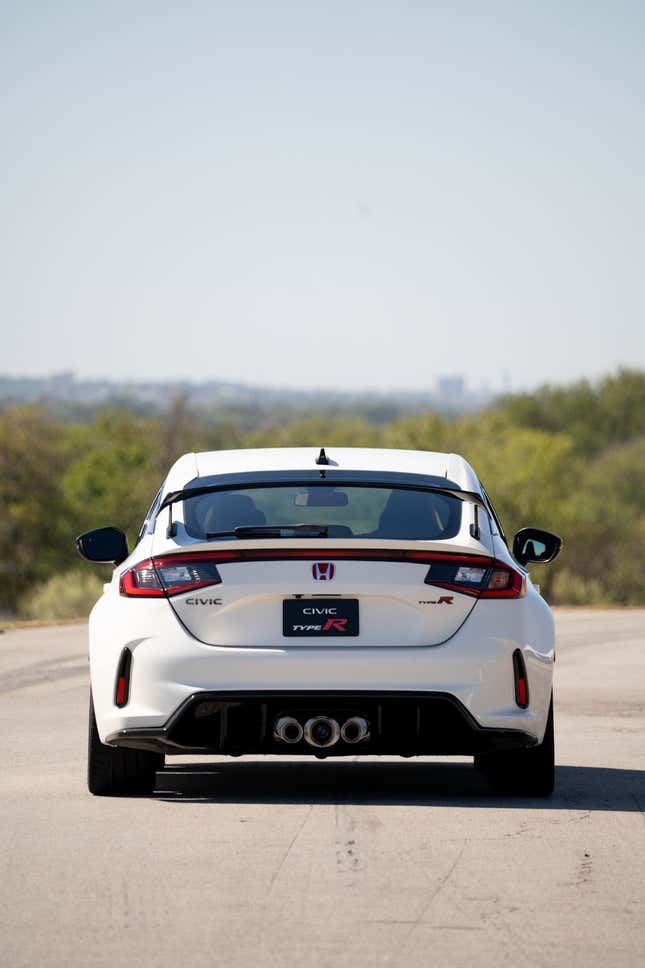
Instead, the company reined in the leash-tugging enthusiasm of the last Type R, creating a more focused car for the track day enthusiast. By any objective metric, the new Type R is surely better, and it’s just as entertaining as the old one at its new, higher limits. The 2023 Type R may be more restrained at legal speeds, more bored with the daily commute, but such is the tradeoff for a car that keeps its composure around Harris Hill. Which matters more to you?
